The special practice for liver diseases in the heart of Munich
Special practice
for liver diseases
- Benefit from an experienced team of experts
- Learn to appreciate the optimal individual treatment
- The most modern diagnostic methods give you security
- We are always on the cutting edge of research
Our Philosophy:
The special practice for liver diseases combines
the private touch and the organizational advantages of
a small practice with the standards of a university facility.
New: Extended telephone accessibility
Prime Address
in the heart
of Munich

In our practice with focus on the liver we want that our patients draw the best possible benefit from our expert knowledge in chronic liver diseases.
The result:
Dedicated to prevention, diagnosis and treatment of the various forms of liver diseases the small liver center right in the heart of Munich is working with all modern tools.
In a practice for general medicine or gastroenterology patients with liver disorders represent only a small part; hepatology (the science of liver disease) has made a huge progress recently and at the same time has become increasingly more complex. To keep up with knowledge in that field is very laborious and at the final end almost impossible in a non-specialized practice.
Special practice
Our aim is to give our patients access to the latest
developments in hepatology by cooperating with university
facilities and at the same time to offer personal care.
As an independent practice we are free to work
together with the best specialists from all disciplines,
independently of where they work.
Goals
- to prevent
the development of liver disease
through prophylactic measures; - to diagnose liver disorders before
irreversible damage has occurred; - to prevent the progression of
an existing liver disease; - to treat liver disease according to up-to-date
guidelines and to improve the quality of those affected.
JungFischerZachoval
Maria-Christina Jung began her education at the Institute for Immunology at the Ludwig-Maximilians-Universität, Munich, Gottfried Fischer at the Institute of Clinical Pharmacology and Visceral Research at the University of Berne. Reinhart Zachoval began his medical training at the Max von Pettenkofer Institute in Munich, went then to Boston at the Massachusetts General Hospital and got his further education in internal medicine and gastroenterology at the Grosshadern Medical Center of the Ludwig Maximilians University in Munich.
All three members of the team have worked together successfully for many years.
Maria-Christina Jung has focused for many years on the question of why an infection with
liver damaging viruses (hepatitis B, hepatitis C) can become chronic, and has, through numerous
scientific studies, contributed to a better understanding of the underlying mechanisms of viral
infection. In addition, she is taking part in numerous clinical studies to improve the treatment of
hepatitis B and hepatitis C and investigates the effect of new therapeutic approaches on the
human immune system.
Reinhart Zachoval was the principal investigator of numerous studies for the treatment of chronic
hepatitis B and C at Grosshadern Medical Center and was the head of a large outpatient department
there for many years taking care of more than 3000 liver patients per year (including liver
transplant recipients).
Specialization in the field of liver
- through the day-to-day treatment of people suffering from serious liver disease
- through special technical examination like duplex sonography and liver stiffness measurements by ultrasound ("elastography")
- through the application of special endoscopic and imaging techniques ( in collaboration with others)
- through assessment of potential liver transplantation candidates and follow-up long term care after the operation
Left image: Healthy liver. Right image: Cirrhosis of the liver.
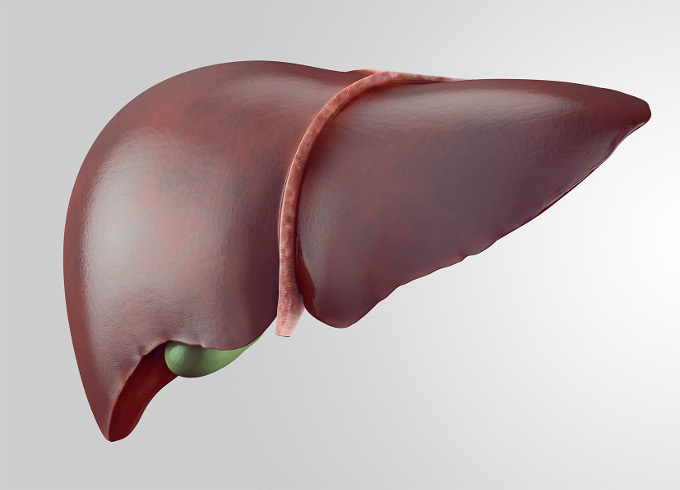
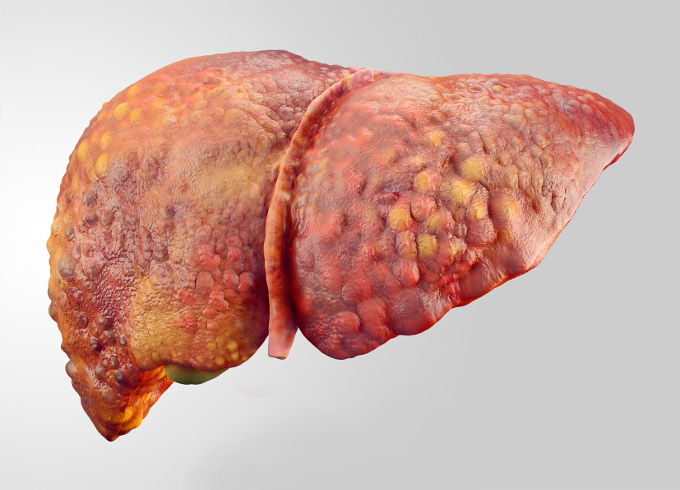
How can one recognize liver disease and
what can be done to prevent it?
Some liver diseases can be prevented (for instance by immunization or by avoiding toxic substances), and in others an early diagnosis is important for an effective treatment. An advanced chronic liver disease often becomes obvious by pronounced tiredness and weakness, by accumulation of fluid in the peritoneal cavity ("ascites") by massive hemorrhage from oesophageal varices or from mental disturbances up to coma.
However, an early diagnosis can be difficult because many liver diseases develop in the absence of unambiguous symptoms. Even people who feel completely healthy may suffer from liver disease. Through our special knowledge and the application of the most up-to-date techniques, we are especially qualified to make a balanced assessment and to decide on the appropriate (and sometimes life-saving) treatment at the earliest possible time point.
Left image: advanced liver disease, water accumulation in the abdomen. Right image: possible symptom of liver disease, yellowish (icteric) eyes.

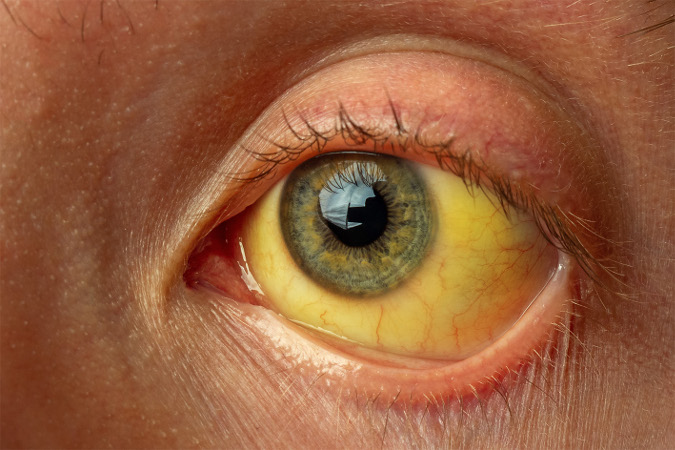
Treatment: methods and techniques
There are only very few liver diseases that can’t be beneficially influenced through timely therapy. Therefore, complementary to our fundamental laboratory and technical examinations, we also perform the completely painless ultrasound elastography procedure. With this technology the firmness of the liver is measured in order to detect the presence of a liver conversion — a so-called fibrosis. The firmer the liver, the more advanced the fibrosis and therefore the greater the risk for developing liver cirrhosis.
Until now, such a diagnosis was only possible through the removal of liver tissue and a subsequent biopsy, which is painful and carries a risk of hemorrhage and is therefore declined by many patients. In contrast, the ultrasound elastography can be carried out as an outpatient procedure and can be repeated as often as required — for a precise diagnosis, but also to document the success of a therapy.
Left image: ARFI Imaging: painless measurement of liver elasticity by ultrasound.
Upper right: pathogen Hepatitis C virus. Lower right: microscopic view of liver cells.
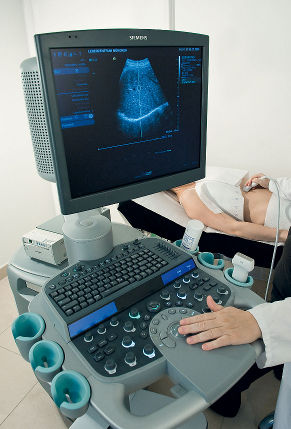
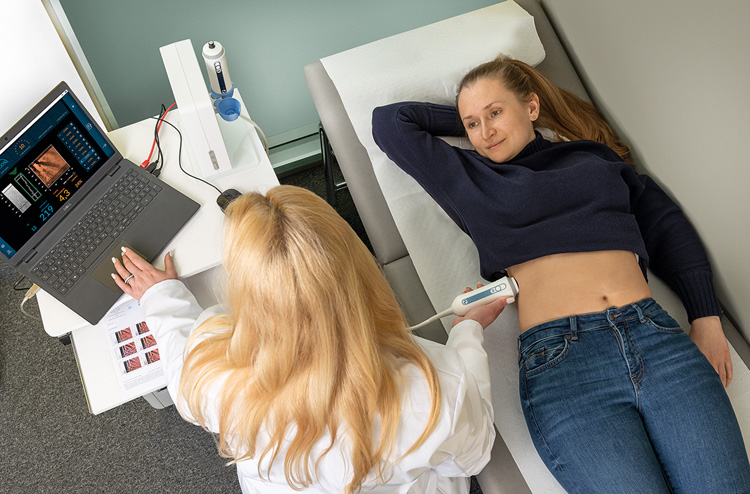


State-of-the-art technology with the FibroScan®
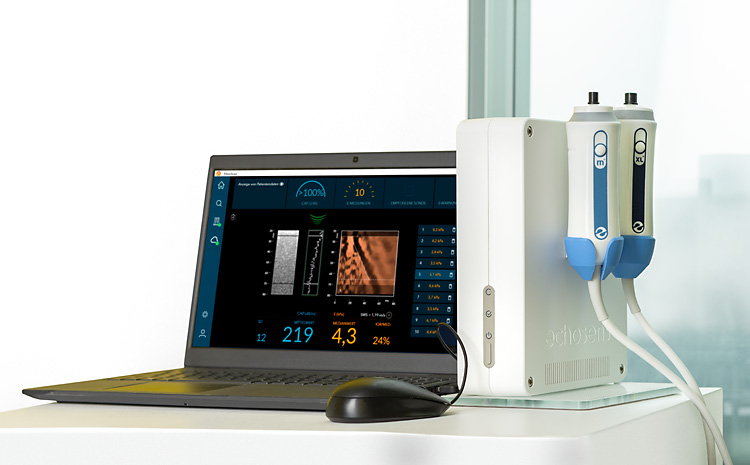
Diagnostic progress for the benefit of our patients
We offer you an examination with the FibroScan® from echosens. Non-invasive elastography is also suitable for assessing the formation of connective tissue (fibrosis) in the liver over time (increase or decrease, e.g. due to drug treatment or lifestyle changes) and is therefore an extremely important prognostic factor.
If cirrhosis is present, the result of the elastography also helps to assess the risk of varicose veins forming in the oesophagus (oesophageal varices) and the risk of liver cancer developing (HCC).
A CAP measurement can also be carried out during the same examination to determine the fat content of the liver. We recommend the examination at the initial presentation of patients with known elevated serum liver values, as a follow-up for chronic liver diseases of various causes (Hepatitis B and C, autoimmune liver diseases, fatty liver disease, metabolic syndrome, obesity, diabetes, high blood pressure, lipometabolic disorders) or for diseases with liver involvement.
For our Patients - Downloads
Here you can download your registration forms and treatment information and fill them out on your computer or tablet.
Please print out the documents yourself and bring them signed to our practice at Sendlinger Tor.
Thank you for your efforts.
Questionnaires for download and preparation:
Only private patients and self-payers:
Treatment (PDF)
You’re welcome
Consultation by arrangement
by phone or online via samedi.
Please send me your practice flyer for information only and without obligation.
How to reach us:
By public transportation/MVV
U1, U2, U3, U6 or Bus 152, Tram 16, 17, 18, 27
By car:
Parking garage at Oberanger or Herzog-Wilhelm Straße
Show Leberzentrum Munich in Google Maps
Leberzentrum in Munich
Prof. Dr. Jung & Dr. Fischer
& Prof. Dr. Zachoval
Sendlinger-Tor-Platz 9
D-80336 München
Tel.: +49 (0)89/37 42 67 10
Fax: +49 (0)89/37 42 67 09
Extended telephone accessibility exclusively for:
- Referring medical practices and medical consultations
- Private patients and self-payers
- International patients
- Tue 11:00 - 12:00 am and 3:00 - 5:00 pm
- Wed 11:00 - 12:00 am and 3:00 - 5:00 pm
- Thu 3:00 - 5:00 pm


